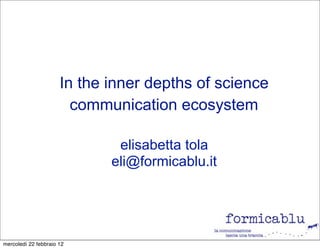Science Comm @UniBicocca
- 1. In the inner depths of science communication ecosystem elisabetta tola eli@formicablu.it mercoledì 22 febbraio 12
- 2. mercoledì 22 febbraio 12
- 3. William Whewell 1794 - 1866 mercoledì 22 febbraio 12
- 4. mercoledì 22 febbraio 12
- 5. mercoledì 22 febbraio 12
- 6. Joseph Norman Lockyer 1836 - 1920 mercoledì 22 febbraio 12
- 7. Samuel Hubbard Scudder 1837 - 1911 mercoledì 22 febbraio 12
- 8. Enrico Fermi Manhattan Project 1942 - 1945 mercoledì 22 febbraio 12
- 9. science has, as a whole, been insulated from «... ethics for two quite distinct reasons. On the one hand, academic scientists are supposed to be indifferent to the potential consequences of their work. On the other hand, industrial scientists do work whose consequences are considered too John Ziman serious to be left in their hands. My point is that post-academic science has 1925 - 2005 features that make nonsense of the traditional barriers between science and ethics. (…) Science 4 December 1998: Vol. 282. no. 5395, pp. 1813 - 1814 mercoledì 22 febbraio 12
- 10. As the competition for funds intensifies, project proposals are forced to become more and more specific about the expected outcomes of the research, including its wider economic and social impact. (…) Universities and research institutes are no longer deemed to be devoted entirely to the pursuit of John Ziman knowledge "for its own sake." (...) 1925 - 2005 Another feature of post-academic science is that it is largely the work of teams of scientists, often networked over a number of different institutions. Where, then, do the ethical responsibilities lie? (…)» Science 4 December 1998: Vol. 282. no. 5395, pp. 1813 - 1814 mercoledì 22 febbraio 12
- 11. mercoledì 22 febbraio 12
- 12. Craig Venter mercoledì 22 febbraio 12
- 13. mercoledì 22 febbraio 12
- 14. Hwang Woo-suk 2006 mercoledì 22 febbraio 12
- 15. Renato Dulbecco 1914 - 2012 mercoledì 22 febbraio 12
- 16. Sanremo 1999 mercoledì 22 febbraio 12
- 17. Stephen Jay Gould 1942 – 2002 mercoledì 22 febbraio 12
- 18. This View of Life mercoledì 22 febbraio 12
- 19. «Of all that I shall miss in closing these columns, I shall feel most keenly the loss of fellowship and interaction with readers. Have we not shared 300 episodes of mutual learning?» 2002 mercoledì 22 febbraio 12
- 20. mercoledì 22 febbraio 12
- 21. Science Public mercoledì 22 febbraio 12
- 22. SCIENCE ic s b l comunicazione SCIENCE P u SCIENCE l ic u b ic s P s b l s P u l ic u b SCIENCE P mercoledì 22 febbraio 12
- 23. Background Latest result Scientific journal On the media Latest result Background mercoledì 22 febbraio 12
- 24. Background Latest result Scientific journal On the media Latest result Background mercoledì 22 febbraio 12
- 25. mercoledì 22 febbraio 12
- 26. mercoledì 22 febbraio 12
- 27. mercoledì 22 febbraio 12
- 28. mercoledì 22 febbraio 12
- 29. mercoledì 22 febbraio 12
- 30. mercoledì 22 febbraio 12
- 31. mercoledì 22 febbraio 12
- 32. News organizations — old and new — still produce most of the content audiences consume. But each technological advance has added a new layer of complexity—and a new set of players —in connecting that content to consumers and advertisers. In the digital space, the organizations that produce the news increasingly rely on independent networks to sell their ads. They depend on aggregators (such as Google) and social networks (such as Facebook) to bring them a substantial portion of their audience. mercoledì 22 febbraio 12
- 33. And now, as news consumption becomes more mobile, news companies must follow the rules of device makers (such as Apple) and software developers (Google again) to deliver their content. Each new platform often requires a new software program. And the new players take a share of the revenues and in many cases also control the audience data. mercoledì 22 febbraio 12
- 34. Where  from? mercoledì 22 febbraio 12
- 35. mercoledì 22 febbraio 12
- 36. mercoledì 22 febbraio 12
- 37. mercoledì 22 febbraio 12
- 38. mercoledì 22 febbraio 12
- 39. mercoledì 22 febbraio 12
- 40. mercoledì 22 febbraio 12
- 41. mercoledì 22 febbraio 12
- 42. mercoledì 22 febbraio 12
- 43. mercoledì 22 febbraio 12
- 44. mercoledì 22 febbraio 12
- 45. What  for? mercoledì 22 febbraio 12
- 46. digital  anima7on inves7ga7on radio  feature podcast products TV  web  video news long  form blogs mercoledì 22 febbraio 12
- 47. mercoledì 22 febbraio 12
- 48. mercoledì 22 febbraio 12
- 49. mercoledì 22 febbraio 12
- 50. mercoledì 22 febbraio 12
- 51. mercoledì 22 febbraio 12
- 52. mercoledì 22 febbraio 12
- 53. mercoledì 22 febbraio 12
- 54. mercoledì 22 febbraio 12
- 55. It is true that the number and variety of publishing platforms is exploding in the Internet age. But very few of these entities are engaged in original reporting. In short, we face a situation in which sources of opinion are proliferating, but sources of facts on which those opinions are based are shrinking. The former phenomenon is almost certainly, on balance, a societal good; the latter is surely a problem. mercoledì 22 febbraio 12
- 56. And  now  the  data mercoledì 22 febbraio 12
- 57. mercoledì 22 febbraio 12
- 58. 2011:  Data  win  the  Pulitzer mercoledì 22 febbraio 12
- 59. mercoledì 22 febbraio 12
- 60. Outside  the  media,  in  the  public  agora mercoledì 22 febbraio 12
- 61. mercoledì 22 febbraio 12
- 62. mercoledì 22 febbraio 12
- 63. mercoledì 22 febbraio 12
- 64. mercoledì 22 febbraio 12
- 65. mercoledì 22 febbraio 12
- 66. mercoledì 22 febbraio 12


































































